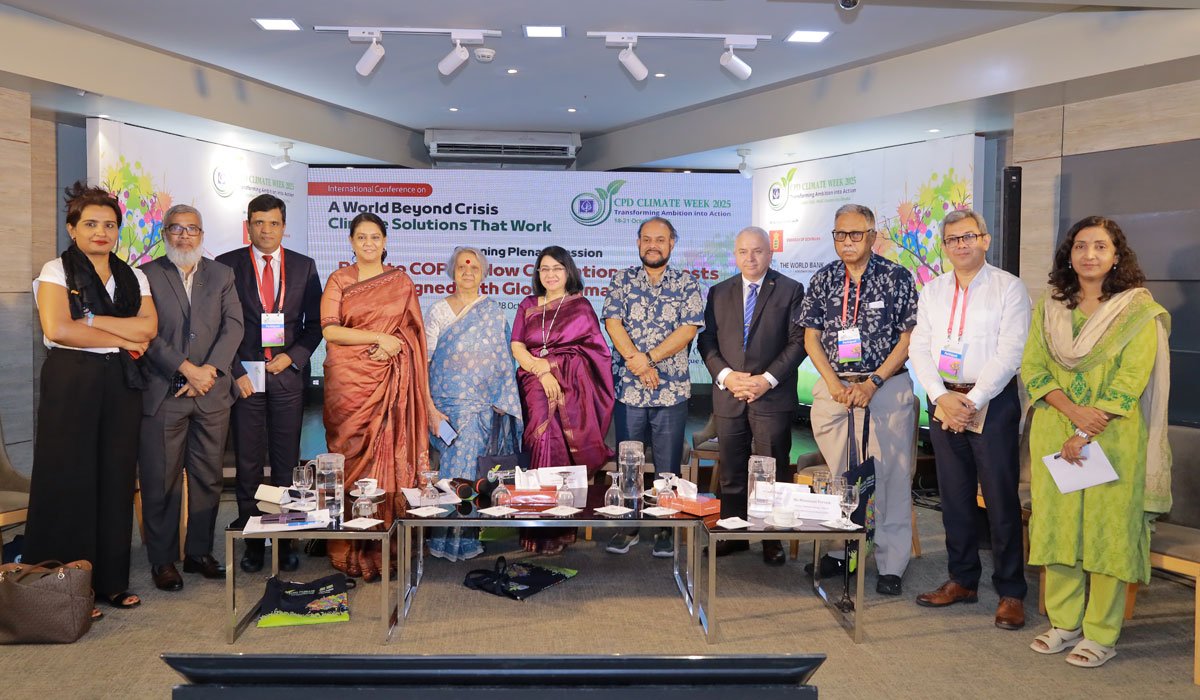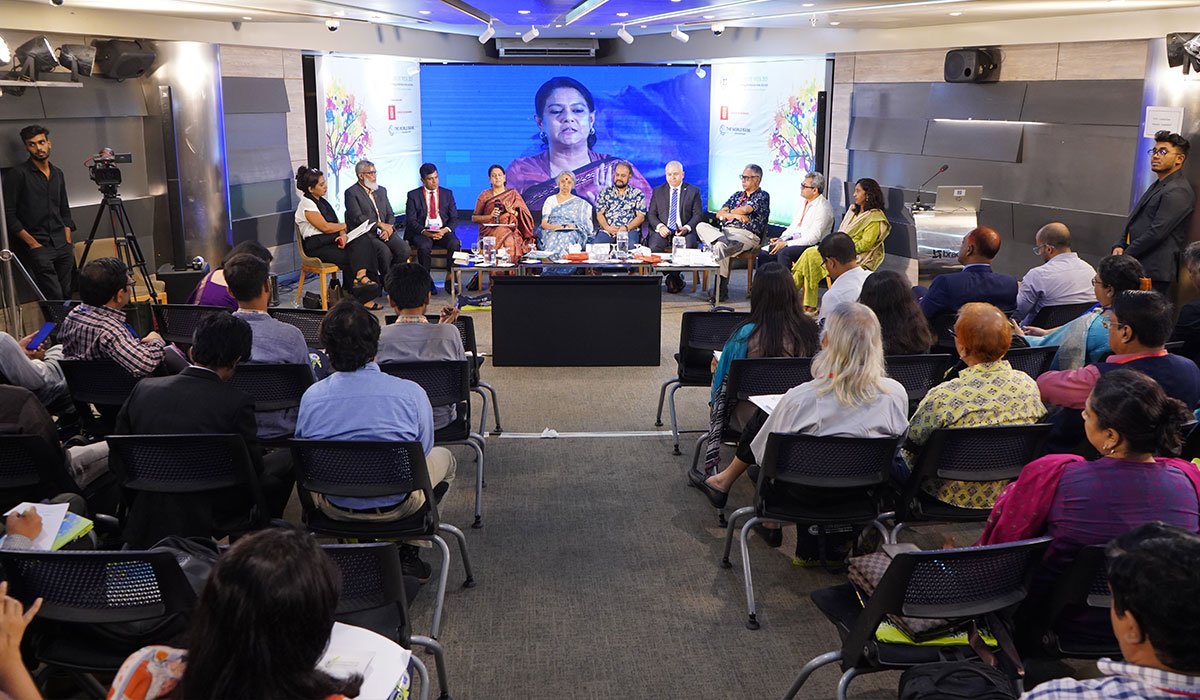
Achieving climate resilience requires countries to integrate global ambitions into national realities — ensuring policies, financing, and governance are grounded in local priorities. Speakers at the Opening Plenary of the conference, “Road to COP30: How Can National Interests Be Aligned with Global Climate Goals?”, emphasised that developing nations like Bangladesh must craft context-specific strategies that balance growth and sustainability.
Held on 18 October 2025 as part of CPD Climate Week 2025, the session brought together national and international experts who called for inclusive, transparent, and country-driven approaches to turn global commitments into actionable results ahead of COP30.
Advocate Syeda Rizwana Hasan, Adviser at the Ministry of Environment, Forest and Climate Change, called for a fundamental rethink of development, saying that “money alone cannot solve the crisis — our entire approach to growth must change.” She highlighted upcoming initiatives, including green building standards, renewable energy systems across government agencies, and a partnership with the UK Met Office for real-time flood data.
Emphasising a broader view of sustainability, Ms Khushi Kabir, Member of CPD’s Board of Trustees, urged policymakers to look beyond environmental protection alone. “We must connect climate, energy, transport, and people’s wellbeing,” she said, adding that Bangladesh must make its voice heard at COP as a proactive actor, not a victim.

From the development finance perspective, Ms Mousumi Pervin of the Asian Development Bank said Bangladesh needs at least USD 5 billion a year for adaptation and must mobilise both concessional and private funds. She noted that while Bangladesh’s emissions are low, “we must pursue adaptation and mitigation co-benefits through strategic negotiation.”
Representing Switzerland, Ms Shirin Sultana Lira underscored the need for localisation, transparency, and innovation. She cautioned that debt is a growing burden — “for every five dollars we get in loans, we repay seven” — and called for more grant-based funding that reaches communities directly.
Mr Ulrich Kleppmann of the German Embassy reminded participants that climate responsibility is shared globally, saying, “We are all part of the same system that must work together.” He noted Germany’s USD 13.8 billion contribution to climate finance and encouraged Bangladesh to lower barriers for renewable energy investment and private sector participation.
From academia, Dr Ainun Nishat of BRAC University’s C3ER stressed that Bangladesh must prioritise adaptation, warning that weak embankments and poor coordination could worsen climate disasters. “We emit less than one per cent of global emissions, yet face some of the harshest impacts,” he said.

Government representative Md Ziaul Haque of the Department of Environment said Bangladesh is aligning its National Adaptation Plan with upcoming global targets and seeking early access to the Loss and Damage Fund. He emphasised that national priorities must be integrated with global efforts to strengthen resilience.
On the issue of climate finance, Md Shamsuddoha, Chief Executive of CPRD, said existing pledges are far below what is required. He called for stronger advocacy at COP30 on loss and damage finance, fossil fuel phase-out, and just transition mechanisms.
Echoing that stance, Dr Shah Abdul Saadi from the Economic Relations Division said adaptation finance must be provided as grants, not loans. He noted that Bangladesh is already running 46 NAP projects and exploring market-based instruments like climate bonds to mobilise additional resources.
Representing industry, Mr Mohammed Sohel of the BGMEA said the RMG sector aims to reduce greenhouse gas emissions by 30 per cent by 2030. With over 260 green factories, he emphasised the need for more innovation, R&D, and SME inclusion to sustain progress.
Speaking virtually, Dr Abid Qaiyum Suleri of Pakistan’s Sustainable Development Policy Institute (SDPI) urged developing nations to lead their own climate agendas instead of waiting for global consensus. “We cannot remain passive,” he said. “Our communities are already acting — we must go to COP with that confidence.”
Mr Foqoruddin Al Kabir, Senior Research Associate of CPD called for policies that are context-specific and adequately funded. “Our per capita emissions are among the world’s lowest, yet our vulnerabilities are immense,” he said. “Only through alignment and solidarity can we turn pledges into real progress.”

The session concluded with a shared understanding that only through inclusive, country-led strategies and stronger global cooperation can nations like Bangladesh bridge the gap between ambition and action on climate resilience.
🌎 Check out all session web posts and videos of the international conference “A World Beyond Crisis: Climate Solutions That Work.”
- Inaugural Session | A World Beyond Crisis: Climate Solutions That Work
Web post | Video - Opening Plenary | Road to COP30: How Can National Interests Be Aligned with Global Climate Goals?
Web post | Video - Parallel Session 1 | Operationalising NDCs in Climate Vulnerable Countries
Web post | Video - Parallel Session 2 | Climate and Gender: Integrating Equity in Policies
Web post | Video - Parallel Session 3 | Carbon Pricing and Carbon Markets in Bangladesh
Web post | Video - Parallel Session 4 | Climate-smart Agriculture and Food Security
Web post | Video - Parallel Session 5 | Climate Finance, Landscape, Policy and Governance
Web post | Video - Parallel Session 6 | High Level Dialogue on Achieving Debt Sustainability in the Face of Climate Change
Web post | Video


